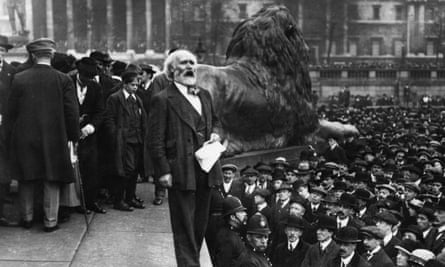Next month will mark the centenary of Keir Hardie’s death. It’s said that, when telling his friend Sylvia Pankhurst that he planned to form a new political party, Hardie was advised to have just three policies; votes for women, chastity for men and prohibition for everyone. The chastity pledge never surfaced and prohibition disappeared from Labour’s deliberations (probably at around the time that George Brown was deputy leader).
Labour was, however, to be the first political party to campaign for women’s emancipation as part of a programme set out by the 129 trade unionists (including two delegates from the Postmen’s Federation) who met in Farringdon Street, City of London, on 27 February 1900 to launch the Labour Representation Committee.
This was to be no debating society, no exclusive sect designed to make its members feel virtuous for being involved. Hardie was clear, Labour should “capture power not destroy it”. He believed in achieving power through the ballot box, eschewing class warfare and the communist attachment to “dictatorship of the proletariat”.
He forged a Labour party rooted in the decency and moderation of working-class communities who wanted nothing to do with intolerant ideology. Inspired by Methodism more than Marxism, Hardie’s party was driven by the twin ideals of greater equality and the eradication of poverty. Throughout most of the Labour party’s history, the affiliated unions have been the ballast preventing Hardie’s vision from drifting on a sea of extremist rhetoric towards electoral irrelevance.
I thought of Hardie when I heard the comments on the leadership election from Dave Ward, who leads the Communications Workers Union – in particular, Ward’s view that Labour was too focused on winning elections (and that Jeremy Corbyn would provide an antidote to the “virus” of the Blair years). I’ve known Ward for 25 years, during which he has never been a political activist. His interest was always firmly on the industrial side of the CWU. The sad thing is that he obviously felt that the only way he could attract attention as a newly elected general secretary was to slag off the Labour party. In this respect he was following the example of some other leaders of affiliated unions whose only emotion when talking about Labour seems to be anger, the only volume setting loud.
I can understand why the “virus” drivel should emanate from our political opponents, including those in the various far-left sects who last tried to bring their finger-jabbing intolerance into our party 35 years ago. What I’m puzzled by is why it should come from trade union leaders whose members benefited so much under the last Labour government.
Before new party members become enmeshed in the “culture of betrayal”, it’s worth taking a second to examine the charge that Labour in government did nothing for working people.
Leave aside the transformation in health and education (plus additional jobs and extra pay for nurses and teachers), the 3,000 Sure Start centres, the Disability Discrimination Act, the Human Rights Act, civil partnerships, rescuing 1.2 million children from absolute poverty and 1.8 million from relative poverty, pension credit (which made the single biggest contribution to the fact that for the first time in recorded history being old is no longer associated with being poor), the Pension Protection Fund, the resuscitation of apprenticeships and the world’s first legally enforceable carbon reduction targets. Is it accurate to suggest that trade unionists fared badly in the Blair years?
Hardie’s vision of a national minimum wage wasn’t enacted by MacDonald or Attlee, Wilson or Callaghan; it was introduced by the Blair government along with the right to paid holidays (later extended by law to be in addition to bank holidays). Every single worker was given the right to be accompanied at a disciplinary or grievance hearing by a trade union official, regardless of whether the union was recognised and irrespective of whether the individual was a member. During the “virus” years, a woman’s right to paid maternity leave rose from 16 weeks to nine months. Paternity leave was introduced for the first time.

The ban on trade union representation at GCHQ was lifted along with the pernicious “check-off” legislation, which forced unions to re-recruit their members every three years. The Public Disclosures Act gave protection to whistleblowers, new rights were enacted to protect part-time and temporary workers, agency workers and those subjected to control by gangmasters. Legislation on union recognition insisted that if 50% plus one of the workforce was recruited, the union was automatically recognised. Prior to 1997 it had always been the case that an employer could sack striking workers en masse on day one of a dispute. The Blair government changed the law to prevent that happening. Far from being a period when trade unions were betrayed, it was the most benign period in their history and, if I may gently point out to Ward, the importance of winning elections can be summed up in four words – the trade union bill.
So who should lead Labour? I have never had the ambition or the appetite that this job requires. Neither has Jeremy Corbyn – as he’s honest enough to admit. The Commons vote on the welfare bill was a mess. Shadow cabinet members felt they had to support collective responsibility. Corbyn had no such constraints. He’s been cheerfully disloyal to every Labour leader he’s ever served under. That’s fine so long as members understand that it’s the loyalty and discipline of the rest of us that created the NHS, the Open University and all the other achievements I’ve mentioned and the many that I haven’t. Indeed they established the very benefits that David Cameron and George Osborne are seeking to remove. Are the other three candidates to be condemned for an abstention in opposition, but not applauded for being part of the government that helped to increase the income of the working poor in the first place?
My vote will be cast for Yvette Cooper. Having been the first political party to advocate votes for women and having advanced the feminist cause through equal opportunities legislation in the 70s and all-women shortlists in the 90s, Labour has fallen behind other political parties in failing to elect a woman as leader. Of course this decision should not be made on gender alone. I believe that Cooper has the intellect, the experience and the inner steel to succeed in this most difficult of roles. She was largely responsible for one of the other great successes of our time in government – the strategy to reduce teenage pregnancies. I’ve been enormously impressed by her poise, command of her brief as shadow home secretary, and her ideas on tackling inequality, child poverty and a radical programme of genuine devolution. She’s defended our economic record against the crass lies of those who suggest that Labour created the global financial meltdown; and she understands the crucial difference between pretending that the fiscal deficit can be ignored and planning to reduce it on a timescale that doesn’t choke off growth and hit the poorest hardest.
In my view only Cooper can unite the party to win again. Those members who can’t give her their first preference should give her their second. After over a century of male leaders we have an election where the most qualified candidate to lead our party back to government happens to be a woman. Let’s end the madness and elect her.

